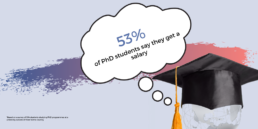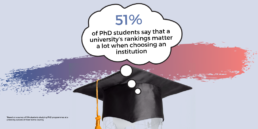The project set out to consider the extent to which international PhD students valued reputation, and how reputation figured in their destinational choice for a PhD, with a particular desire to better inform those responsible for university communications, marketing and leadership. With support from the World 100 Reputation Network members for the interviews, and the British Council in Japan and FindaDegree.com in circulating the surveys, the research took place in 2014. With over 100 student interviews, and 600 respondents to an online survey, we are able to construct some strong insights into the behaviours and motivations of top academic students, and their perception of and attitudes towards reputation.
For the qualitative aspect of the research, we interviewed over 100 PhD students for an hour each, in leading world-class universities, exploring how they defined reputation from a PhD student perspective – both conceptually and in terms of value to them in their current context. Exercises were used to isolate the role of reputation in their choice and to examine at what level reputation is relevant – professor, subject, research field, programme, university, research team, sponsor or funders etc. We also looked at the relationship between ranking status and perceived reputation, which was particularly interesting after our work with academics in 2011/12 showed the academics were keen only to move to top World 100 universities, and always saw their own university as more reputable than rankings suggested. We were keen to see whether students from different continents or countries behaved differently towards reputational indicators.
Finally, we were keen to see whether students could understand brand, and whether that was the same as reputation for them. All of these questions clearly have implications for recruitment and reputational communications management directed at potential PhD students in world-class universities.
A survey of near identical questions was also distributed to PhD students to explore the issues quantitatively. This is written up as a separate report, but references are made to the findings where relevant
The project set out to discover:
- How do international PhD students define university reputation? What clues do they seek in terms of defining a reputable university?
- To what extent do these students use rankings/other information in decision making
- What role does reputation play in attracting student talent relative to more tangible or factual factors such as location, facilities, price?
- To what extent do rankings correlate with reputation and act as a proxy for reputation?
- How do international PhD students regard the reputation of their university?
- Do students understand the concept of brand, in the wider sense of character?
- How can universities articulate reputation in ways that international PhD students value?
When considering a university, its reputation is a key driver of choice for PhD students
The final version of the reports from the research, PhD Choice Factors: How international PhD Students choose top universities and interpret reputation and rankings, were published in November 2014. Members of the W100 Network can access the full reports from the news and resources page, plus those involved in the research can also download their individual reports.
Research Downloads:
Available to Members Only
Become a Member
The World 100 Reputation Network is a group of the best universities in the world, delivering research that enhances reputation and offering leaders the chance to develop their own careers on a global stage. Members benefit from events and study tours, training, monthly media monitoring, and unique reputation research to provide institutional advantage.





